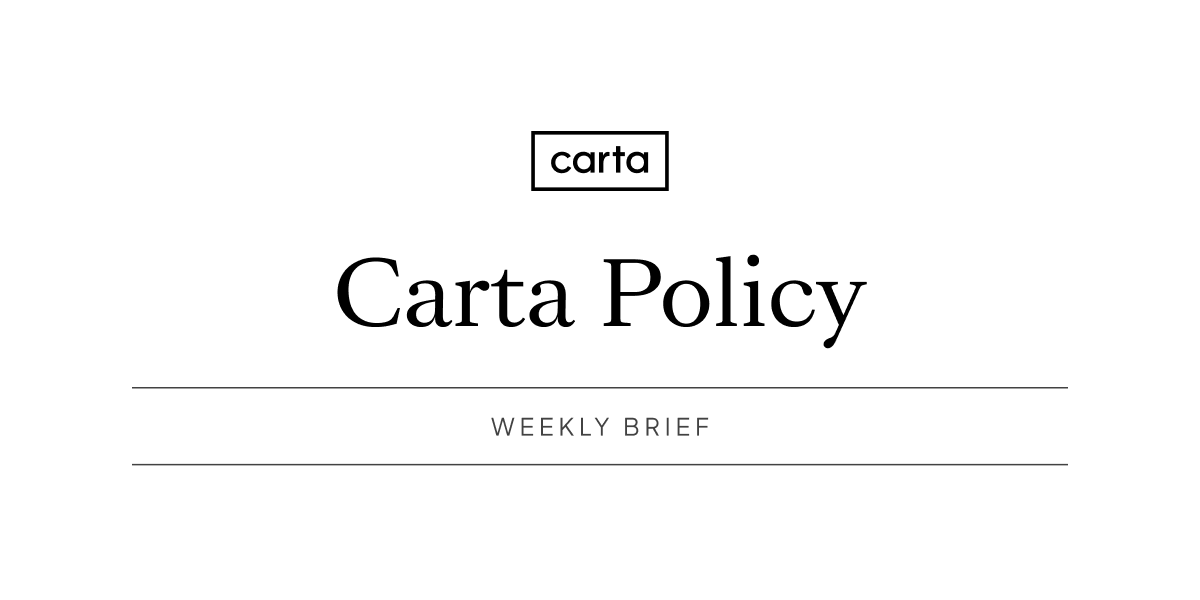Topline
-
Biden Administration releases long-awaited EO on AI
-
Senate Banking GOP outlines capital market reform efforts
-
Fifth Circuit sends buyback rule back to SEC
-
SBA expands access to small business loan program in underserved markets
Biden Administration releases long-awaited EO on AI
This week, the Biden Administration released a long-awaited executive order on artificial intelligence, which aims to promote the responsible development and use of AI technology and ensure that the U.S. remains competitive while taking the lead regulating the emerging technology. As Congress continues to grapple with AI regulation, the EO will drive federal efforts to regulate AI for the time being.
The EO defines AI to include any machine-based system that makes predictions, recommendations or decisions, meaning it will impact a wide range of technologies beyond generative AI across all sectors of the economy. The expansive 111-page EO contains a number of directives to promote the following goals:
-
Safety and security: Safety and security are the primary themes that dominate the Executive Order. Under the EO, companies developing any foundation model that poses a serious risk to national security, national economic security, or national public health and safety must notify the federal government when training the model, and must share the results of all red-team safety tests. The National Institute of Standards and Technology (NIST) will set the standards for red-team testing. The EO also calls for the development of a National Security Memorandum to ensure the U.S. military and intelligence community use AI safely and counter adversaries’ military use of AI.
-
Federal procurement of AI systems: The EO tasks the Office of Management and Budget with setting the standard for federal procurement of AI systems, including establishing guidance to agencies within 150 days to strengthen the effective and appropriate use of AI, advance AI innovation, and manage risks from AI in the Federal Government.
-
AI-generated content: The EO requires several agencies (including the Department of Commerce and U.S. Copyright Office) conduct studies and develop guidance on the impact of AI-generated content.
-
Promoting innovation and competition: To ensure that the U.S. has the available talent needed to lead in the development of AI technology, the EO calls for streamlining processes for noncitizens to “work on, study, or conduct research in AI or other critical and emerging technologies.” The EO also calls for the National Science Foundation (NSF) to establish a National AI Research Resource (NAIRR) to facilitate collaboration between the government and private sector. Also, the EO requires the Small Business Administration (SBA) to allocate funding for AI initiatives and ensure that grant programs are eligible for AI-related small businesses.
-
Worker protections: The EO calls for several agencies to produce reports on AI’s potential labor-market impacts, and study and identify options for strengthening federal support for workers facing labor disruptions from AI.
-
Civil rights & equality: The EO directs various federal agencies to ensure that the use of AI by the federal government does not promote bias and discrimination. For example, the Federal Housing Authority and Consumer Financial Protection Bureau (CFPB) are directed to use their authorities to prevent bias in the housing and consumer financial markets, including in the areas of underwriting and appraisals.
-
Consumer protection and privacy: Protecting American consumers from fraud is a mandate of the EO, which directs agencies to consider “clarifying the responsibility of regulated entities to conduct due diligence on and monitor any third-party AI services they use, and requirements and expectations related to the transparency of AI models and regulated entities’ ability to explain their use of AI models.” The EO takes steps to protect commercially available information (CAI) held by federal agencies, while also acknowledging the need for Congress to pass bipartisan data privacy legislation.
-
Global leadership: The EO requires the Secretaries of Commerce and State to work with key international partners on global technical standards, mandating a report within 270 days on a plan for global engagement. Some of this engagement has already been seen—this week, the U.S., China, EU, and 26 other countries signed the Bletchley Declaration, which commits the countries to come together to identify risks of shared concern, while also developing cross-country policies to mitigate them.
There are a few notable provisions missing: no licensing regime for advanced AI models, no outright bans on the highest-risk uses, no defined rules around copyright infringements or other IP law, and no mandates on releasing training data.
Reception and next steps: The general reception to the EO has been positive—the Biden administration seems to have taken steps to appease the entire spectrum of those invested in AI policy: the tech companies, the risk-averse, and the faction that wants to ensure that there is still room for innovation amid the new regulations. The EO is certainly a step towards laying out a work plan for what needs to be done, but EO authority is limited and needs to be supported by regulation or law. Given the number of agencies involved and interests to be considered, there is a long path ahead for these policies to be implemented.
Senate Banking GOP outlines capital market reform efforts
Sen. Tim Scott, the lead Senate Banking Committee Republican (and presidential candidate), announced a framework—the Empowering Main Street in America Act—aimed at reforming the capital markets framework to help drive innovation, expand opportunity, and promote economic growth. The framework outlines a number of key pillars, including:
-
Promoting small business capital formation by streamlining and modernizing rules to raise capital in the public and private markets and improving access to capital for underserved and diverse populations
-
Expanding investment opportunities in private markets by expanding additional pathways to qualify as an accredited investor
-
Strengthening market confidence and integrity by targeting fraud and bad actors
-
Increasing congressional oversight of the SEC and strengthening regulatory cost-benefit analyses
These broad themes are intended to drive industry engagement and feedback to help inform the policies that will serve as the basis of legislation.
Why it matters: Sen. Scott’s capital markets reform framework is a separate workstream, but complements capital formation efforts in the House Financial Services Committee. Broader capital formation legislation is unlikely to move forward this Congress given private market skepticism among senior Senate Democrats and the broader political environment. However, certain aspects—like expanding accredited investor onramps—have bipartisan support and could gain traction, and at a minimum, help push the SEC to moderate aspects of its private market agenda, which is expected to make it harder to access capital and restrict investor access. This new legislative effort also provides an opportunity for the innovation ecosystem to engage and help shape policies to promote access to capital and investment opportunities and enhance the overall private market ecosystem.
Fifth Circuit sends buyback rule back to SEC
The Fifth Circuit Court of Appeals dealt a blow to the SEC this week finding the SEC’s new stock buyback disclosure rule was “arbitrary and capricious” under the Administrative Procedures Act for failing to adequately analyze the economic implications of the rule. The court did not vacate the rule, but gave the SEC 30 days to cure the defects.
Why it matters: The SEC has been criticized of late for inadequate cost-benefit analysis on major rulemakings, and judicial scrutiny is increasing as industry has increasingly turned to the courts to challenge the regulator’s authority. The stock buyback decision could have implications for the private fund adviser rule litigation, which has also been challenged in the Fifth Circuit on the basis of being arbitrary and capricious.
SBA expands access to small business loan program in underserved markets
The Small Business Administration (SBA) has approved Small Business Lending Company (SBLC) licenses for three new lenders, marking the first expansion of the 7(a) loan program in more than 40 years.
-
The lenders include Arkansas Capital Corporation, Alaska Growth Capital, and Funding Circle. These lenders focus on historically underserved markets, including small businesses in rural, Native, and lower-income communities.
Why it matters: Higher interest rates and tighter lending conditions have created additional challenges for small businesses seeking capital. Expanding access to SBA’s primary small business lending program in traditionally underserved markets will help fill funding gaps, providing entrepreneurs with more access to affordable capital to start, operate, and grow their businesses.
New from Carta: State of Private Markets Report
Read Carta’s most recent State of Private Markets report to learn why Q3 offered encouraging signs for founders and startups.

News to know
-
-
Jury convicts SBF. After weeks of arguments, the jury in Sam Bankman Fried’s trial deliberated for only a few hours before returning a guilty verdict. The disgraced FTX founder faced a suite of charges including wire fraud, several forms of conspiracy to commit fraud, money laundering and campaign finance violations. Attorneys for the U.S. government outlined a scheme that defrauded investors of billions; SBF maintains his innocence.
-
DOL proposes new fiduciary standards for retirement accounts. The proposed Labor Department rules would extend ERISA fiduciary protections to episodic advice, such as 401(k) rollovers. Comments are due January 2, 2024.
-
GAO concludes that SEC crypto accounting guidance needed to go to Congress. The Government Accountability Office (GAO) published a report this week concluding that the SEC’s Staff Accounting Bulletin 121, which outlined how certain companies should account for cryptocurrencies on their balance sheets, should have been subject to congressional review, which would have included a procedure that allows Congress to disapprove the rule.
-
IRS braces for millions of crypto filings. The IRS is expecting to receive roughly 8 billion information returns related to cryptocurrency this season, a staggering number previewed by Julie Foerster, the IRS’s director of digital assets. Foerster said the flood of Form 1099-DA submissions could overwhelm the IRS’s systems. The agency is in the process of implementing new crypto reporting requirements that will take effect in 2026.
-
Senate Committee advances IRS counsel nominee. Marjorie Rollinson, President Biden’s pick to be the IRS’s chief counsel and an assistant general counsel in the Treasury Department, advanced out of the Senate Finance Committee on a 16-14 vote. There was some bipartisan support for her nomination, which will likely be approved by the full Senate before the holidays.
-
FTC enhances data breach reporting for non-banks. The Federal Trade Commission (FTC) revised its Safeguards Rule to require non-banking financial institutions to make robust notifications when data breaches occur, the latest development in the Biden administration’s broader effort to enhance scrutiny of non-bank financial companies.
-
SEC staff release new Form ADV FAQs, which includes questions regarding exempt reporting adviser filings.
-
Upcoming events
-
House Ways and Means Committee hearing: Ensuring that “Woke” Doesn’t Leave Americans Broke: Protecting Seniors and Savers from ESG Activism - November 7 at 7 a.m. PT / 10 a.m. ET
-
House Financial Services Committee hearing: The Tangled Web of Global Governance: How the Biden Administration is Ceding Authority Over American Financial Regulation - November 7 at 7 a.m. PT / 10 a.m. ET
-
Senate Homeland Security and Governmental Affairs hearing: The Philosophy of AI: Learning From History, Shaping Our Future - November 8 at 6:30 a.m. PT / 9:30 a.m. ET
-
House Financial Services Committee hearing: A Review of Our Sanctions Regime and Efforts to Combat Terrorist Financing - November 8 at 7 a.m. PT / 10 a.m. ET
-
House Financial Services Committee hearing: Member Day hearing - November 9 at 6 a.m. PT / 9 a.m. ET

